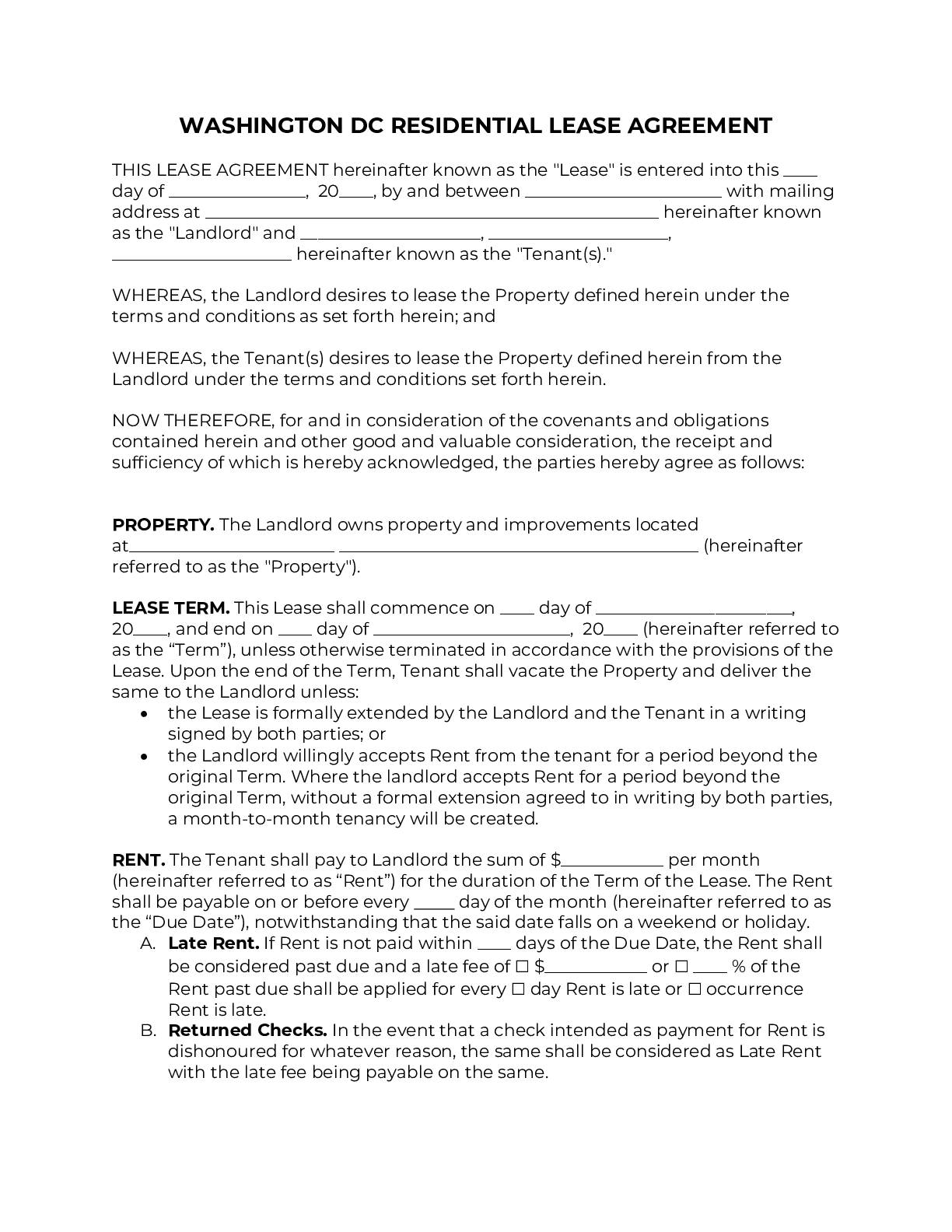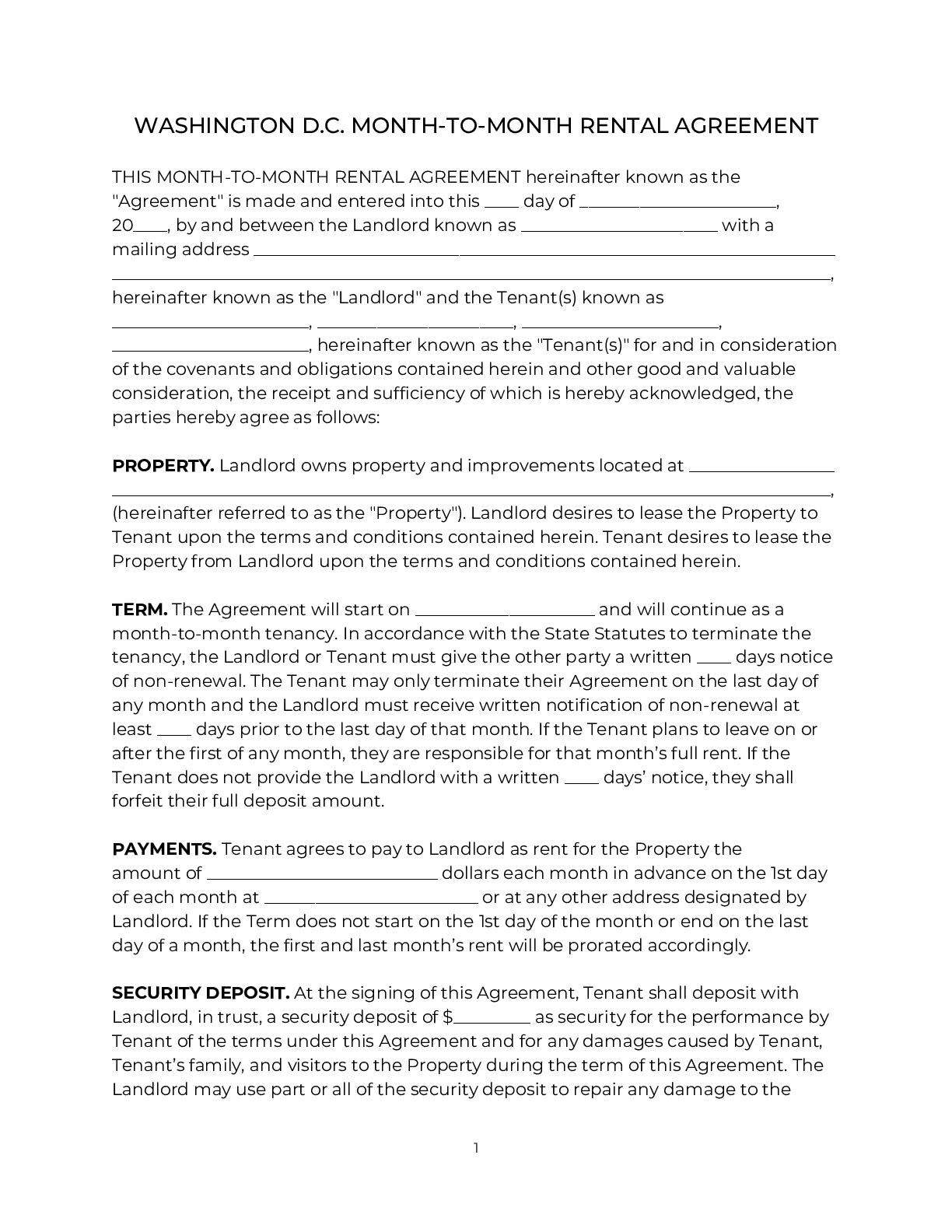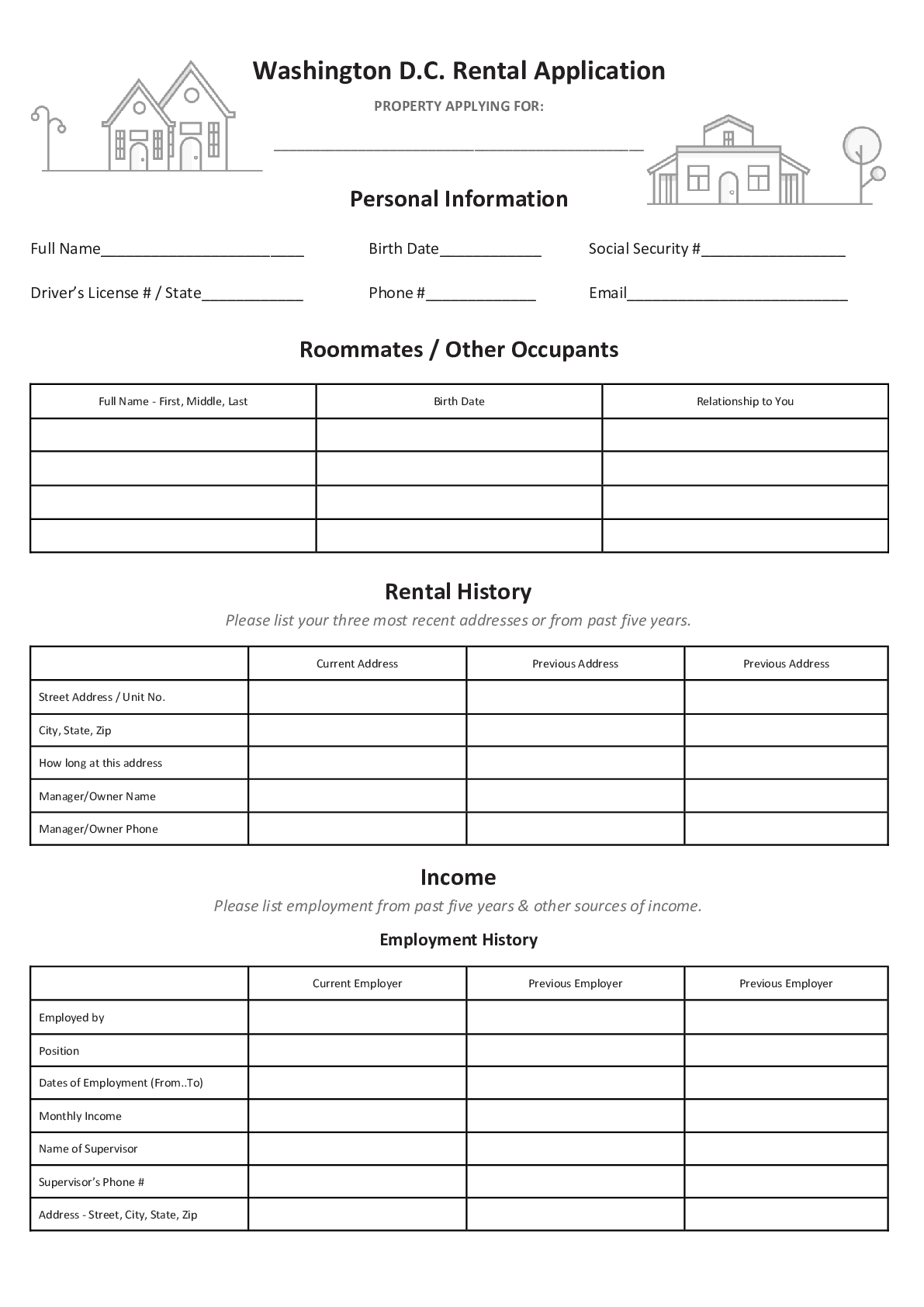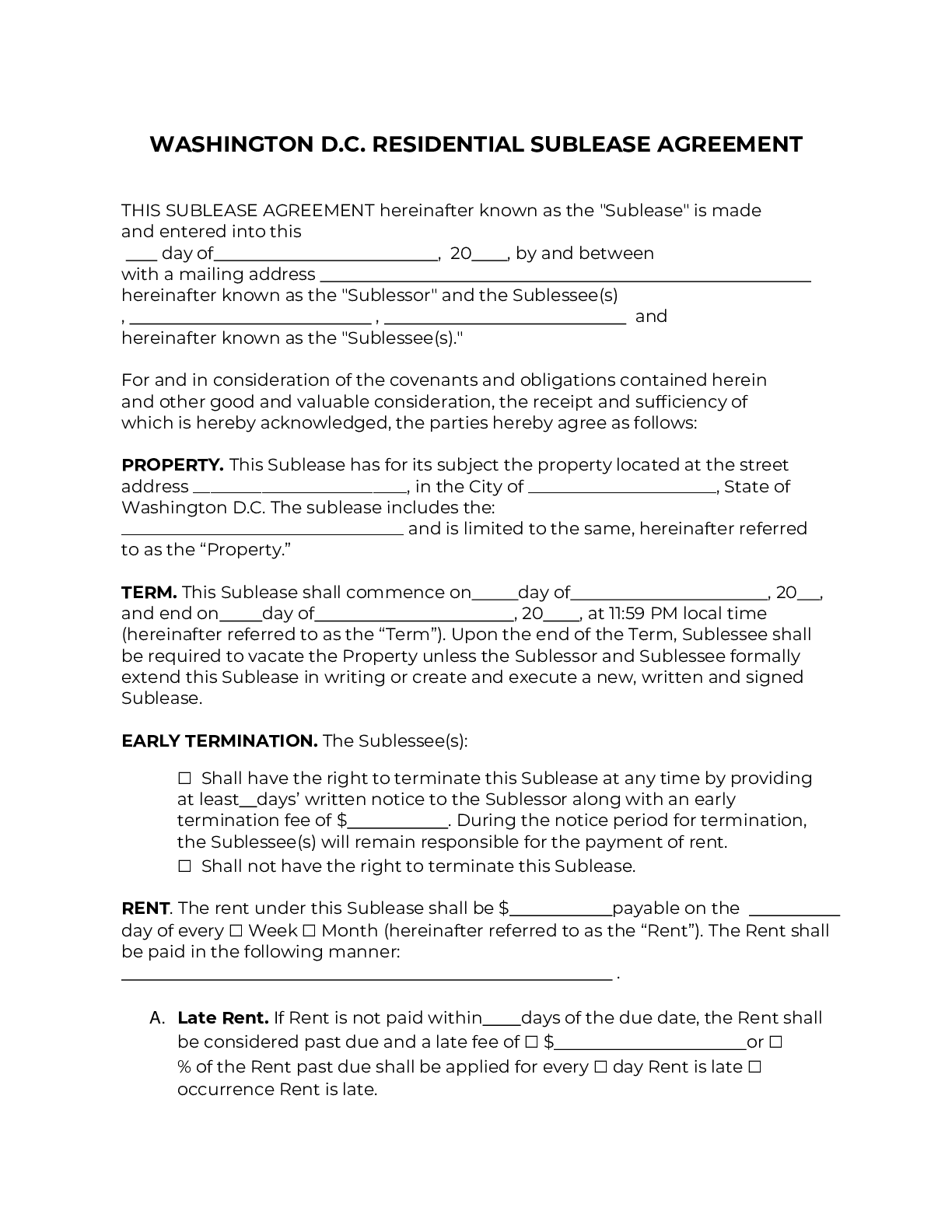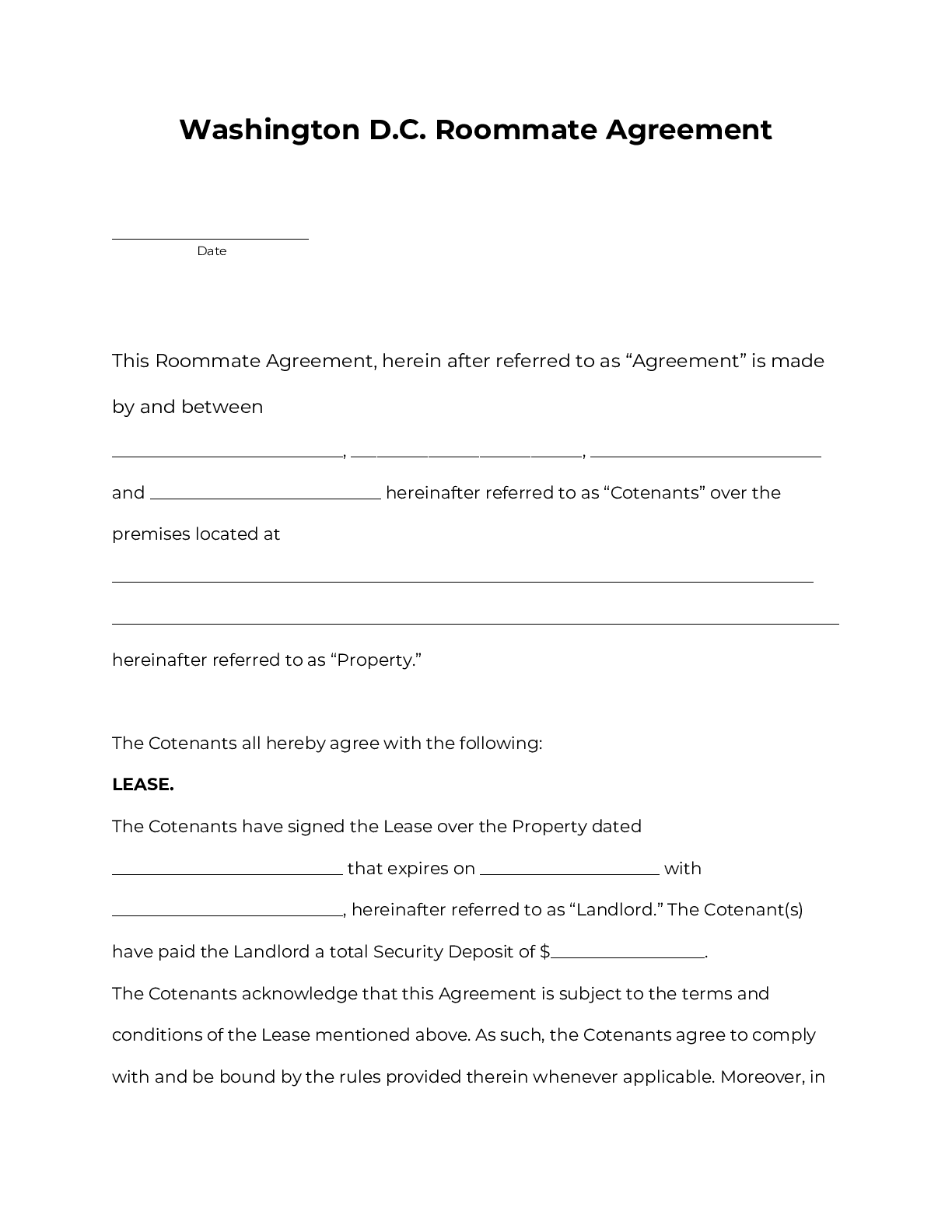A Washington D.C. rental agreement is a legal contract between a landlord overseeing a rental property and a tenant using the property. District of Columbia landlord-tenant law governs and regulates these agreements.
Washington D.C. Rental Agreement Types
Washington D.C. Required Residential Lease Disclosures
- Tenant’s Bill of Rights (required for all leases) – Washington D.C. landlords must provide each tenant with a copy of the city’s Tenant Bill of Rights.
- RAD Form 3 (Applicant Disclosure Form) (required for all leases) – Washington D.C. tenants applying for a lease have a right to get certain disclosures published by the city’s Rent Administrator.
- RAD Form 5 (Notice of Disclosure Forms) (required for all leases) – Washington D.C. housing providers must give a complete and signed Form 5 disclosure to the tenant.
- Rent Control/Exemption Status (required for some leases) – Washington D.C. landlords must disclose a property’s rent control status. This disclosure must specify the housing accommodation, its business license, and a copy of the registration or claim of exemption, together with the most recent notice filed. Tenants also get a pamphlet which explains local rent control laws and regulations.
- Mold Disclosure (required for some leases) – Washington D.C. landlords must disclose any indoor mold contamination within the last three years. This includes (if available) proof of professional treatment.
- Voter Registration Packet (required for all leases) – Washington D.C. landlords must provide tenants with a voter registration packet developed by the District of Columbia Board of Elections.
- Lead-Based Paint Disclosure (required for all leases) – Landlords must provide an EPA-approved disclosure and informational pamphlet to tenants renting any property built before 1978.
To learn more about required disclosures in Washington D.C., click here.
Common Washington D.C. Residential Leases
- GCAAR Residential Lease – This lease is for members of the Greater Capital Association of REALTORS® (GCAAR). Many Washington D.C. area rentals use it. The form covers a variety of issues from mold treatment to tenant bankruptcy.
Washington D.C. Landlord Tenant Laws
- Warranty of Habitability – Washington D.C. landlords can only rent out habitable property. This means providing certain basic health and safety features like heat, plumbing, and electricity. Landlords must repair any issues within a reasonable time after proper notice from the tenant. Failure to repair lets a tenant sue the landlord or terminate the lease. Tenants in Washington D.C. also may withhold rent (including repairing and deducting from the rent), or report the landlord to housing authorities.
- Evictions – Washington D.C. landlords may evict for rent nonpayment, lease violations, or illegal acts, among other things. Before filing eviction, landlords must serve tenants with prior notice to pay, comply or quit, depending on the eviction type. This means most evictions in Washington D.C. take between a few weeks to a few months.
- Security Deposits – Washington D.C. caps security deposits at a maximum of one month’s rent. Upon lease termination, a landlord must return any unused portion of a security deposit to the tenant within 45 days.
- Lease Termination – Washington D.C. requires at least 30 days of advance notice for ending a month-to-month lease. Terminating a fixed-term lease early requires (in most cases) active military duty, landlord harassment, uninhabitable property, or domestic abuse.
- Rent Increases and Fees – Washington D.C. landlords must keep the requirements of the Rental Housing Act of 1985 (if applicable). The Office of the Tenant Advocate updates the rent increase limit yearly for applicable units. Notice for a rent increase is the amount of notice required for a tenant to terminate the lease, plus 30 days (minimum of 60 days). Washington D.C. caps late fees at 5% of the monthly rent. Returned check fees have no cap in most cases ($15, for certified low-income tenants).
- Landlord Entry – Washington D.C. landlords may enter rental property for reasonable business purposes like maintenance, inspections, and property showings. Before entering, they must provide at least 48 hours of written advance notice, except for emergencies.
- Settling Legal Disputes – Washington D.C. lets small claims courts hear landlord-tenant disputes, as long as the amount in controversy is under $10,000.
To learn more about landlord tenant laws in Washington D.C., click here.
Sources
- 1 D.C. Code § 42–3509.04(b)
-
No rent increases, whether under this chapter, the Rental Accommodations Act of 1975, the Rental Housing Act of 1977, the Rental Housing Act of 1980, or any administrative decisions issued under these acts, shall be effective until the first day on which rent is normally paid occurring more than 60 calendar days after the notice of the increase is given to the tenant, or, if the notice was provided before January 1, 2024, more than 30 days after the notice of the increase is given to the tenant; provided, that the requirements of § 42-3505.54(b) are met.
Source Link - 2 D.C. Code § 42–3505.54(b)
-
A housing provider shall not place or cause to be placed in a residential lease or rental agreement a requirement that the tenant provide more than a 30-day notice to the housing provider of the tenant’s intention to vacate the premises, unless the lease or agreement also requires the housing provider to provide the tenant with a written notice of any rent increase that is at least 30 days more than that time period.
Source Link - 3 D.C. Mun. Regs. tit. 14, r. 14-6207.1
-
Tenants whose checks are returned for insufficient funds shall be assessed a fifteen dollars ($15) returned check fee, and shall be required to make payment within five (5) working days, from the date of the returned check notice, for the amount outstanding. This payment shall be in the form of a “money order” or “cashier’s check.”
Source Link




